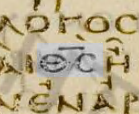Listen to the following creed at the end of the third chapter of Timothy.
And without controversy great is the mystery of godliness:
God was manifest in the flesh,
John 1:1, John 1:14, 1 Peter 1:20, 1 John 1:2, 1 John 3:5-8,
justified in the Spirit,
Mt 3:16, Rm 1:4
seen of angels,
Mt 4:11, Mt 28:2,
preached unto the Gentiles,
Acts 10:34, Rom 10:18
believed on in the world,
Rom 16:26, 2 Cor 1:19, Col 1:6
received up into glory.
Luke 24:51, Mark 16:19
The Preserved Word teaches that this creed is without controversy. However, the enemy attacks it with much controversy. There is only one clear statement in the bible that says “God was manifested in the flesh” and just like the clearest statement on the Trinity (1 John 5:7) and the clearest statement on Christ’s humanity (Phil 2:6) we find this in the new modern Bibles with new meaning.
Most of the modern Bibles render the first word “He” instead of “God” which is wrong. The problem is compounding of two issues. Let’s look at the first one.
THEOS or OS
In Greek, which the verse was written in, the word most used in the manuscripts is THEOS which means God. But sometimes, just sometimes the Jews would abbreviate the name of God when writing it. It was a way to show reverence to the name of God. When they do this it is called a nomen sacrum. And just like when we make an abbreviation we put an apostrophe they have a little line they use to signify what they have done. In the word THEOS the TH is represented by one letter theta which is a O with a – in it. Then they would write the last letter and put the line over it. Keep in mind the old greek letter for s looks like a c. Here is a picture of what it looked like:
Most of the greek manuscripts have the full name for God here, THEOS. And all of the church fathers who quote this verse use THEOS. Here is an example from Dionysius in about 200 long before Sinaticus was written.
But one of the oldest manuscripts (yes, the old suspect manuscript that the NU loves Sinaticus) has the nomen sacrum. However, it is obvious (so they say) that the little lines were added later to the manuscript. So their claim is that the word was just os and someone came along later and put a dash in the middle of the O and above the c. And guess what os means in Greek… I mean you would think it would be ‘HE’ since that is what most of the new Bibles have there. No, it means “which” or “who” depending on what it is referring to. In this case the object would be “godliness” so it should be rendered “which”. So, why do they render it “He”. Good question. Perhaps because in context of the following verses it would make no since and that this creed is obviously about Jesus. It is really not a matter of different Greek texts, it’s just wrong. There is simply no textual support for “He” or as is sometimes substituted “Christ”. Neither the TR nor the NU allows for “He” or “Christ”. It’s simple to look it up for yourself and see. You don’t need to be a Greek scholar, just look up the work of the Greek scholars in Strongs.
What does the bible say about it? This is written as a creed and therefore should be a summary of what the bible teaches right? Well in John 1:1 the preserved word of God says that “the Word was God”. And then a few verses later in verse 14 it says that “the Word was made flesh” so that supports the traditional reading along with all the church fathers who quote it and all the Greek manuscripts that have THEOS. In addition, there are several other verses that support this creedal statement: 1 Peter 1:20, 1 John 1:2, 1 John 3:5-8, Rm 9:5, Col 2:9. But does the bible support the creed if it claims that godliness was made flesh? Godliness means to be like God in a holy or righteous way. The bible dictionary defines it as reverence, respect or piety TOWARDS God. That is a very different claim than God himself being made manifest in flesh. It is a much weaker claim. If this is referring to Jesus as the “He” then it is only asserting that he was someone being godly or possessing godliness NOT possessing Godhood. This reminds me of the change that is made in Phil 2:6, although perhaps this one is more subtle it is nevertheless just as grievous.



